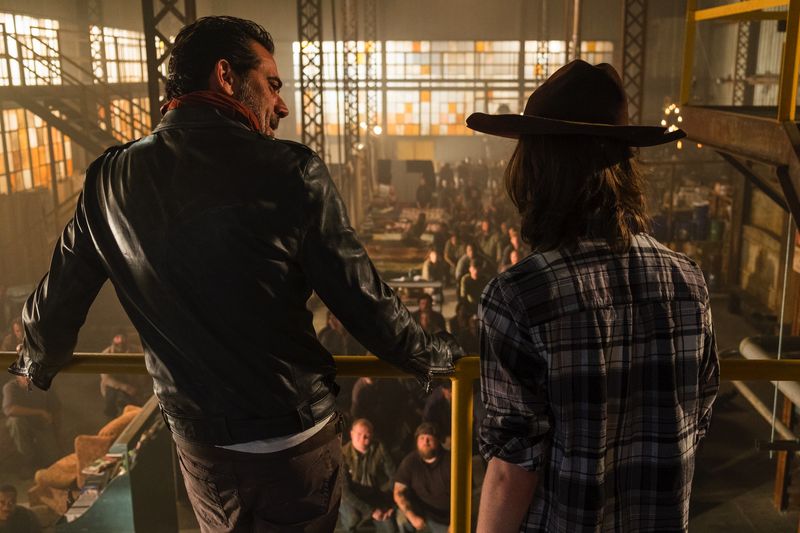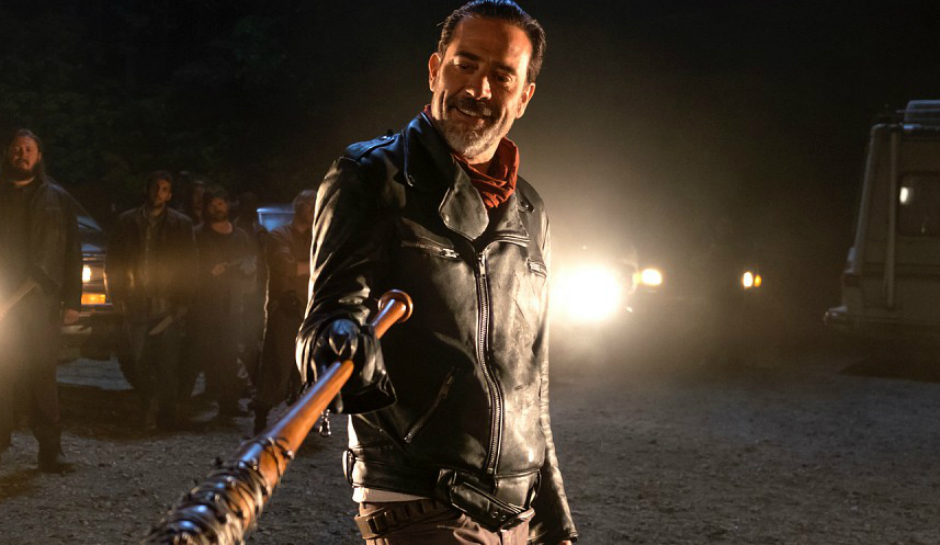-
Recent Posts
- Better Call Saul: There Are No Happy Endings between a “Rock and Hard Place”
- Black Widow Keeps It in the Family for Natasha’s Last Ride
- Loki Finds New Purpose in the Man behind the Mischief
- In its Debut, Star Wars: The Bad Batch Decides Whether to Obey or Rebel
- Nomadland: A Film Out of Time, For Our Times
Archives
Recent Comments
- Ed Clarke on Contact
- Matt on Why “The Frying Game” Is a Dark Horse Contender for The Simpsons’s Worst Episode Ever
- Lilly Dow on Contact
- Stacey on Veep’s Series Finale and the Hollowness of Getting What You Want
- Evan Jaocbs on Contact
Meta
Category Archives: Television
The Walking Dead: “Sing Me a Song” Asks Whether Negan is a Hero or a Villian in his Own Mind

There’s an old saw that says the best villains are the ones who believe they’re the hero of the story. “Sing Me a Song” leaves the viewer wondering if that’s true for Negan in an episode that spends even more time acquainting the audience with him and his fiefdom. There are moments when it seems like Negan truly believes he’s doing good, bringing the progress and security of civilization back to an untamed world. There are others when it seems like he simply enjoying himself within his own twisted version of Disneyland. It’s unclear which of those things he really believes, or if he’s even aware of the distinction. But that ambiguity helps make him The Walking Dead’s most interesting villain yet.
South Park Tries to Forget in its Season Finale: “The End of Serialization As We Know It”

“The End of Serialization As We Know It,” the finale of South Park’s ambitious twentieth season, closes with a speech about wiping the entire Internet clean and offering everyone a chance to start over. Troll Trace, the catalyst for the latest looming global catastrophe to confront this surprisingly consequential Colorado town, had threatened to expose anything and everything that anyone has ever said or done online. The town’s hard fought victory against the website guaranteed that risk of exposure, and the ensuing chaos, wouldn’t come to pass. With the threat extinguished, everyone can have a new start, a renewed chance to go on without all the baggage they’ve accumulated from years of surfing and posting and perhaps even trolling.
That sentiment echoes two articles, both of which are a few years old, but feel even more relevant now than when they were written. The first is a New York Times editorial entitled “The Web Means the End of Forgetting.” It talks about the then-nascent emergence of social media and the way that the rise of what, in the salad days of 2010, was referred to as “Web 2.0” was poised to change things. The emergence of user-generated content as the engine of the Internet meant that more and more of lives was being preserved for the foreseeable future. Everything we posted threatened to become inescapable, destined to follow us and prevent us from living down our worst moments. The second is a satirical video from The Onion that presents the same idea in a much more succinct and amusing fashion, entitled simply: “Report: Every Potential 2040 President Already Unelectable Due To Facebook.”
They, and this episode of South Park, are getting at the same idea — that even though the Internet is an incredible tool that has changed the world, helping to democratize everything from art, to business, and even to politics, there are downsides to the digital lives we lead today. The way that so much of how we consume our media, how we work, and how we interact with the world, is filtered through our digital devices means not only that we’re easier to rile up, but that so much of what we do is captured forever, waiting to rear its ugly head and expose our weaker moments to everyone. That’s the central threat at the core of the show’s season finale.
The Walking Dead: Tara Makes a Hard Moral Choice in “Swear”

I’m not sure I could tell you much about Tara prior to this episode. I knew that she came to the main group via The Governor. I remembered that she was among those who met up with Abraham, Rosita, and Eugene after the prison fell. I recalled that she was dating Denise. But otherwise, like so many of the show’s secondary characters, I’m hard pressed to think of any way in which she’s been fleshed out enough for her to really register for me.
Until now.
The Walking Dead Offers Four Great Sequences and Remembers Those It’s Lost in “Go Getters”

So often, the average Walking Dead episode is a mixed bag — a collection of scenes where half of them excite and the other half result in eyerolls. But what keeps so many still watching is the way that the show can put together a few extraordinary sequences — ones focused on character, or a tense interrogation, or even the usual zombie-killing action — that remind us why we started following the series in the first place. There are four sequences in “Go Getters” that show the potential of The Walking Dead, the things that keep us coming back, in an episode centered on how we honor, vindicate, and above all remember the dead.
The Walking Dead Repeats Itself to Death in “Service”
I enjoyed the season premiere of The Walking Dead better than most. I understand the complaints that it was too bleak, too cruel, and too hopeless, but to my mind, it made sense to embrace those elements in order to establish Negan, both a character and as a threat. There have been so many ineffectual villains on this show, so many antagonists who seemed like mere speed bumps along the way toward Rick and company’s inevitable victory. TWD needed to make a big introduction to convince the audience that Negan and The Saviors were something different, something dangerous and more serious.
I also didn’t mind the hopelessness of that opening episode. Sure, it’s difficult to watch our heroes being broken, to see characters we know and love brutalized while the bad guys take great joy in the effort. But shows like The Walking Dead need stakes. In order for the good guys’ eventual triumph to feel earned and meaningful, the series has to make its main antagonist not only someone whose defeat doesn’t seem preordained, but also someone who’s actually worth beating. The suffering at this point of the arc will, with any luck, pay off down the line when the protagonists strike their blow against Negan and his goons.
The only problem is that the premiere already felt like a lot. It gave us a lot of blood and guts, a lot of horrible acts, and a lot of Negan preening and chewing scenery. That worked as an opening salvo for the character and as the culmination of the build his debut, which had been bubbling up since the midpoint of Season 6. But it was a great deal to take in all at once. The viewer can only stand so much of that level of cruelty and velvet-trimmed venom before it starts to overwhelm.
The Walking Dead: “The Cell” Plumbs the Depths of Daryl and Dwight Better without Words

I’m often struck by the technical and structural audacity of The Walking Dead. It’s frequently a gorgeous show, with visuals that grab you even when the frame isn’t filled with zombies. But it’s also a show that can be quite adept at communicating its ideas and themes with visuals alone, albeit one that is maddeningly inconsistent about when it feels like doing so. To that point, “The Cell” centers on the experiences of two characters, Dwight and Daryl, and opens with a pair of montages with next-to-no dialogue, but which nevertheless tell us everything we need to know about who these characters are and what their situation is.
The Walking Dead Embraces Paradise, Peace, and Deadwood in “The Well”

In between Seasons 6 and 7 of The Walking Dead, I finally found the time to watch Deadwood, the acclaimed, short-lived HBO series that helped usher in the current era of prestige television that The Walking Dead has been trying desperately to be a part of. And though Deadwood is a longstanding critical darling while The Walking Dead has been a perpetual whipping boy in the critical community, the most recent seasons of TWD have focused on the same question that consumed Deadwood for its three-season run — specifically, what does it take to make a society?
That’s an oversimplification of both shows, but to my mind, Deadwood was first and foremost about what it means to build a civilization: the myths we perpetuate, the wheels we grease, and the dirt and blood we try to scrub off the floor or otherwise hide in the process. From the onset of the Alexandria arc, The Walking Dead has been interrogating the same idea. Whether it’s Deanna’s vision for Alexandria as the start of a sustainable bit of rebuilding, or Gregory running the Hilltop as his own little fiefdom, or Negan extracting his pounds of flesh with The Saviors, The Walking Dead has been interested in what type of system, what sort of leaders and visions for the future, will prevail. All of these people, like Deadwood’s Al Swearingen, are trying to fashion a society in the midst of something approaching a state of nature, and this era of the show seems as poised as any to dig into the ways that these differing perspectives clash and conflict.
The Walking Dead Gets Biblical in its Season 7 Premiere, “The Day Will Come When You Won’t Be”

Most people know the bible story of when God tested Abraham. It’s one of those biblical references that just filters through the popular consciousness, even if you haven’t cracked open Genesis anytime lately. The Good Lord tells Abraham, his devoted servant, to prove his devotion by offering his son, Isaac, as a sacrifice. Abraham follows this command, building an altar, binding his son to it, and raising his knife in the air, ready to perform the grisly deed. But God stops Abraham at the last minute, explaining to him that this was all simply a test of his devotion and then providing a ram to be sacrificed instead.
I can remember hearing this story in Sunday school and how the rabbi would milk this moment a bit. Keeping second graders enthralled with bible stories isn’t necessarily easy work, but he knew how to draw out the details of the story, embellish a little at the margins, and hold the tension of moments like that one. Even if you’d heard the rabbi tell this story half-a-dozen times before, he made you believe that maybe this time it would be too late, that Abraham would act and all would be lost. He knew, in short, how to build the suspense.
The Simpsons: Hank Scorpio and a Perfect Tone Are the Keys to Greatness for “You Only Move Twice”

One of the most persistent narratives about how and why The Simpsons fell from grace is that, at some point, the series lost its tether to reality. The argument goes that the tone of the show was always meant to be exaggerated, but also ultimately grounded, and that as the series got on in years, its quality suffered as it moved further and further away from the conceptual limits that kept The Simpsons at least nominally within the real world.
And yet “You Only Move Twice,” one of show’s most acclaimed episodes, also features one of the most outlandish twists in Simpsons history. After Homer moves the family for his new job in faraway Cypress Creek, it turns out that, unbeknownst to him, his cool new boss, Hank Scorpio, is actually a Bond villain. The twist isn’t depicted by way of subtle hints here or there or a last-minute reveal. Instead, the episode spends much of its run time ensconced in city-destroying lasers, ineffective death traps, and flame-thrower battles to repel the U.S. military, the very sort of farfetched fare that typically rankles diehard fans.
Then, to add to the absurdity, at the end of the episode, Scorpio seizes the East Coast and gives Homer a special parting gift — ownership of the Denver Broncos, replete with the team practicing on The Simpsons’ front lawn. It’s so far from reality, not to mention the standard rules of the show’s universe, that the series doesn’t even begin to address these developments in later installments. It’s exactly the kind of ridiculous, game-changing-yet-ignored ending that hated former showrunner Mike Scully and current ruler of The Simpsons roost Al Jean are routinely excoriated for today.
So why does this work so well in “You Only Move Twice”?
Posted in Television, The Simpsons
Tagged Albert Brooks, Episode Reviews, Rick and Morty, The Simpsons Season 8, Tone
Leave a comment


